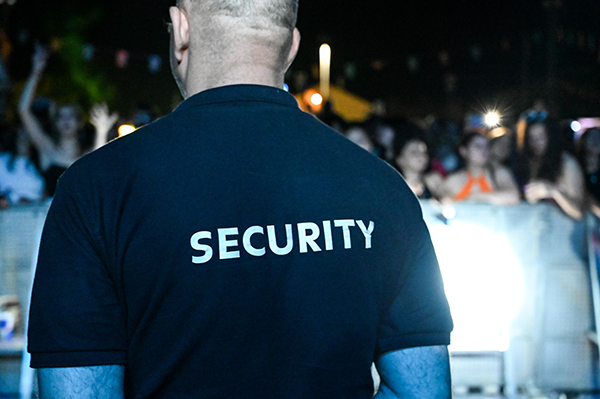Torts/Personal Injury
Oct. 23, 2025
Security guard role in spotlight as Rose Bowl faces lawsuit
Jurors may apply the law as instructed, but rising ticket prices and advancing surveillance are shaping a new expectation: that venues take real responsibility for keeping concertgoers safe.




Donavon J. Sawyer
Senior Counsel
Milanfar Law Firm PC
Phone: (925) 433-6003
Email: dsawyer@milanfarlaw.com

Despite extensive dialogue about artificial intelligence and its potential to disrupt employment across industries, one profession will likely remain stubbornly irreplaceable for quite some time: the security guard. These watchful professionals maintain a visible presence in the places where we shop, dine and gather. However, this familiarity masks an important ambiguity about their fundamental purpose: Are these guards stationed primarily there to protect people or property?
The undertones of this question will likely take center stage for Shelby Lynn Elston and her fiancé Cain Thomas Stephens Webb, who recently filed a civil lawsuit in Los Angeles County Superior Court against the Rose Bowl. During a sold-out RÜFÜS Du Sol concert at the Rose Bowl on Aug. 18, Elston was allegedly beaten unconscious by fellow concertgoer Julio Cesar Lopez Zavala over a spilled drink. This attack reportedly occurred once Zavala returned to the area approximately half an hour after having a drink spilled on him. Cellphone video footage shows a man throwing repeated right-hand punches at someone below him, reportedly Elston. No security personnel appear in the publicly available cellphone video. Social media comments from attendees on platforms like YouTube and Reddit reveal widespread frustration with both logistical failures and security shortcomings at the Rose Bowl that night.
While Elston alleges the Rose Bowl failed to provide adequate security, Lisa Derderian, a spokesperson for the City of Pasadena, characterized the incident as a "one-off," maintaining that the venue consistently provides appropriate security services. This disconnect underscores the core issues that must often be determined in premises liability cases: notice, foreseeability of harm, reasonableness of precautionary measures and implementation of those measures.
If Elston's case is litigated, there are various pieces to the puzzle that will need to be painstakingly gathered through discovery to ultimately provide a clearer picture to the jury at trial:
• How many security guards were on duty?
• What surveillance systems were in place to monitor crowd behavior?
• What de-escalation protocols existed?
• What measures were in place to identify crowd altercations and/or potential threats?
• Did security know about the initial altercation between Elston, her fiancé and Zavala? If yes, how did they respond? If no, why not?
• How long did it take for security to reach Elston after the attack began?
The answers to these questions and others will ultimately shape jurors' perceptions of whether the Rose Bowl took reasonable steps to prevent foreseeable harm to Elston.
Globally, stadium concerts have seen revenue explode from $1.2 billion in 2016 up to $4.6 billion in 2023 -- a 300% increase. The average ticket price for top tours jumped 40% from $96.17 in 2019 to $135.92 in 2024. Venues hosting these concerts have demonstrated their ability to monetize their audiences through concessions and merchandise sales, with security guards prominently stationed near these various goods to protect their revenue streams.
As ticket prices and costs of goods skyrocket, so do patrons' expectations regarding experience, safety and security. Concertgoers paying premium prices expect not just better entertainment and production values, but also comprehensive safety measures that allow them to enjoy the show without fearing for their well-being.
At trial, jurors must acknowledge and follow legal standards and the court's instructions. However, economic realities create undercurrents that influence their overall perceptions in the courtroom. The combination of high-ticket prices and advancing surveillance technology may lead jurors to expect venues to prioritize patron safety more aggressively. Managing thousands of concertgoers creates inherent security difficulties, and physical altercations often involve shared responsibility between parties that can complicate a jury's ability to determine liability. When these complications are combined with the fact that venues are typically shielded from corporate exposure through insurance coverage, incidents like Elston's do not necessarily prompt meaningful reform of a company's security policies or strengthen measures on the ground.
Venues and their insurers may soon receive a clear message from juries through the frequency in which they return verdicts against defendants in these cases: If you want to protect your bottom line, start by protecting the concertgoers who generate it. Implementing comprehensive safety measures that prevent injuries isn't just good business -- it is a legal necessity.
As concert revenues continue climbing, the question becomes not whether venues can afford better security, but whether they can afford not to provide it. Security guards will remain a fixture at entertainment venues for the foreseeable future. But perhaps it's time to ensure that entities hosting these record-breaking concerts safeguard patrons' well-being with the same vigilance they apply to protecting merchandise. Tellingly, you rarely hear reports about merchandise being stolen from vendor booths. In an industry built on live experiences, nothing damages the bottom line -- in concerts or in the courtroom -- quite like the perception that you prioritize profits over the mental and physical well-being of the audiences who pay top dollar to attend. When charging a premium for an experience in these venues, ample security fundamentally becomes part of the expected experience. Ultimately, concertgoers are paying for lasting memories of an unforgettable performance, not the lasting trauma of preventable violence that leaves them with brain, spinal and other injuries that rob them of the life they once knew.
Submit your own column for publication to Diana Bosetti
For reprint rights or to order a copy of your photo:
Email
Jeremy_Ellis@dailyjournal.com
for prices.
Direct dial: 213-229-5424
Send a letter to the editor:
Email: letters@dailyjournal.com



